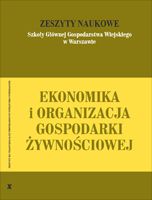Main Article Content
Article Details
ADAMCZYK P., 2013: Przestrzenne zróżnicowanie poziomu i dynamiki zmian wynagrodzeń na obszarach wiejskich w Polsce, Europa Regionum t. 16, s. 133-144.
BLAZQUEZ M., LLORENTE R., MORAL J., 2009: Minimum Wage and Youth Employment Rates in Spain: New Evidence for the Period 2000-2008, Economic Analysis Working Paper Series, Universidad Autonoma de Madrid.
BORKOWSKA S. (red.), 1999: Wynagrodzenie godziwe. Koncepcja i pomiar, IPISS, Warszawa.
BROWN C., 1999: Minimum Wages, Employment and the Distribution of Income, Handbook of Labour Economics, vol. 3b, s. 2101-2163.
BROWN C., GILROY C., KOHEN A., 1982: The Effect of the Minimum Wage on Employment and Unemployment, Journal of Economic Literature, vol. 20, s. 487-528.
BUKOWSKI M. (red.), 2005: Zatrudnienie w Polsce 2005, Ministerstwo Pracy i Polityki Społecznej, Warszawa.
BURKHAUSER R.V., COUCH K.A., WITTENBURG D.C. 1996: "Who Gets What" from Minimum Wage Hikes: A Re-Estimation of Card and Krueger's Distributional Analysis in Myth and Measurement: The New Economics of the Minimum Wage, Industrial & Labor Relations Review, 49(3), s. 547-552.
BURKHAUSER R.V., COUCH K.A., WITTENBURG D.C., 2000: A Reassessment of the New Economics of the Minimum Wage Literature with Monthly Data from the Current Population Survey, Journal of Labor Economics, vol. 18, nr 4, s. 653-680.
BUTCHER T., DICKENS R., MANNING A., 2012: Minimum Wages and Wage Inequality: Some Theory and an Application to the UK, CEP Discussion Paper No 1177, Centre for Economic Performance, London School of Economics and Political Science, Londyn.
CARD D., KRUEGER A.B., 1995: Myths and Measurement: The New Economics of the Minimum Wage, Princeton NJ, Princeton University Press.
DAŃSKA-BORSIAK B., 2014: Płaca minimalna a liczba młodych pracujących. Związki przyczynowe i prognozy wariantowe, Ekonometria 4(46), s. 151-162.
DOUCOULIAGOS H., STANLEY T.D., 2008: Theory Competition and Selectivity: Are all economic facts greatly exaggerated?, No. 06, Deakin University, Faculty of Business and Law, School of Accounting, Economics and Finance.
DE FRAJA G., 1999: Minimum Wage Legislation, Productivity and Employment, Economica, vol. 66, nr 264, pp. 473-488.
DICKENS R., MACHIN S., MANNING A., 1999: The Effects of Minimum Wages on Employment: Theory and Evidence from Britain, Journal of Labour Economics, vol. 17, s. 1-22.
EUROPEAN COMMISION 2015: Learning exchange between Germany, Italy, Norway on 'Minimum wages in the framework of collective bargaining systems' Directorate-General for Employment, Social Affairs and Inclusion, Brussels.
GOLNAU W. 2012: Teoria płacy efektywnej, Zarządzanie i Finanse, Vol. 10, No. 2, Part 1.
JACUKOWICZ Z. 2000: Zróżnicowanie płac w Polsce, w krajach Unii Europejskiej i w USA, IPiSS, Warszawa.
JACUKOWICZ Z. 2007: Analiza minimalnego wynagrodzenia za pracę, seria "Studia i Monografie", IPiSS, Warszawa.
KŁOS B. 2005: Płaca minimalna w państwach członkowskich Unii Europejskiej, Kancelaria Sejmu Biuro Studiów i Ekspertyz, Warszawa.
LEIBENSTEIN H. 1957: The Theory of Underemployment in Backward Economies, Journal of Political Economy, Vol. 65, No. 2, pp. 91-103.
LEMOS S. 2004: Political Variables as Instruments for the Minimum Wage, IZA Discussion Paper No. 1136.
MAJCHROWSKA A., ŻÓŁKIEWSKI Z. 2012: The impact of minimum wage on employment in Poland, Investigaciones Regionales, nr 24, pp. 211-239.
NAGAJ R. 2013: Rola państwa w niwelowaniu nierówności dochodowych. Studia Ekonomiczne/Uniwersytet Ekonomiczny w Katowicach (139 Współczesne problemy ekonomiczne: polityka państwa a proces globalizacji), pp. 248-259.
NEUMARK D., WASCHER W. 2002: Do minimum wages fight poverty?, Economic Inquiry 40(3), pp. 315-333.
NEUMARK D., WASCHER W., 2004: Minimum wages, labor market institutions, and youth employment: a cross-national analysis, Industrial & labor relations review, 57(2), s. 223-248.
NEUMARK D., SCHWEITZER M., WASCHER W. 2004: Minimum wage effects throughout the wage distribution, Journal of Human Resources, 39(2), pp. 425-450.
Ocena funkcjonowania ustawy o minimalnym wynagrodzeniu, 2006: Sejm Rzeczpospolitej Polskiej, druk nr 1064.
PRZYBYŁA M., RUTKOWSKI J., 2002: Poland - Regional Dimensions of Unemployment, [w:] B. Funck, L. Pizzati (red.), Labor, Employment and Social Policy in the EU Enlargement Process. Changing Perspectives and Policy Options, World Bank, Washington DC.
RUZIK A., 2007: Minimalne wynagrodzenie-analiza wpływu na zatrudnienie w Polsce, Polityka Społeczna nr 1/2007, s. 5-9.
SOLOW R.M. 1979: Another Possible Source of Wage Stickiness, Journal of Macroeconomics, Vol. 1, pp. 79-82.
SUCHECKI B., 1999: Narzędzia kształtowania dochodu godziwego w Polsce, [w:] Borkowska S. (red.), Wynagrodzenie godziwe. Koncepcja i pomiar, IPISS, Warszawa.
SZARFENBERG R., Kontrowersje wokół podniesienia płacy minimalnej, http://rszarf.ips. uw.edu.pl/pdf/placmin.pdf (data dostępu: 22.10.2015).
Ustawa z dnia 10 października 2002 r. o minimalnym wynagrodzeniu za pracę (Dz.U. 2002, nr 200, poz. 1679).
ŻÓŁKIEWSKI Z., MAJCHROWSKA A., BRONIATOWSKA P., 2013: Wynagrodzenie minimalne w Polsce. Czy powinno być zróżnicowane regionalnie?, Studia BAS (4), s. 125-157.
Downloads
- Piotr Adamczyk, Intraregional diversity of wages in Poland , Zeszyty Naukowe SGGW - Ekonomika i Organizacja Gospodarki Żywnościowej: No. 112 (2015)
You may also start an advanced similarity search for this article.





